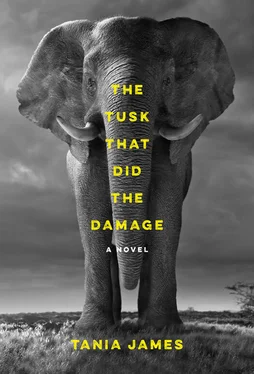But Madame was not interested in relief. “Your husband has an associate by the name of Alias. Have you heard that name?”
“Never.”
“Slippery fellow. Remarkable aim. He once shot an elephant here”—Madame pointed to the space between her own eyebrows—“and the force was so great the animal fell back on its haunches. Usually the animal falls forward, but this one died sitting up.”
As she spoke, Madame opened a drawer and removed the few photographs that lay on top. “Somehow Alias and his associates climbed up and did their work, and when they were done, they left this memento.”
Leela lowered her face to the photograph Madame had laid on the desk. It took a moment for the shapes to resolve, for her heart to gather speed.
Slowly she made out the twin gray hills that crowned the head, the flaccid ears on either side, but where there should have been a face was a cavity yawning wide, a maw of cut cords and rutted surfaces, a mulch of crimson and bone. Madame traced two pale ridges that met in a V shape. “Those are the bottom jaws. The back teeth were worn down. He must have been eighty years old. And another time, we found an elephant with only the tusks cut out. That fellow was still breathing when we found him.”
Leela pushed the picture away. “My husband is a farmer, not a butcher. Not anymore. He fell in with bad types. He made some mistakes, he has paid.” There was a bad weight growing dense in her chest. “Why are you showing me this? You just happened to have it in your top drawer, this picture?”
“Open your eyes.” Madame’s face was pleasant, her voice of steel. “Your husband was involved in an ivory route that went from here to Dubai, the details of which I am still trying to learn. He killed fifty-six elephants single-handedly—”
“Who gave you that number? The two-faced idiot who turned him in?”
“—but you see, his last kill is the one that fascinates me. He was perched in a tree when he shot an adolescent male of roughly eight years. A bullet to the back of the head, a clean kill, but not clean enough. Because the mother is there. The mother goes to her dead son. The mother touches her trunk to his. They do that, the mothers, to check for breath. But there is no breath. Your husband waits for her to leave, but she won’t. She simply stands there very still from day to night to dawn. All the while your husband waits in the tree. And when it’s clear she will never leave, Jayan shoots her too, cuts out his five-kilo tusks, both their tails, and leaves. But here is what I will always wonder — why did she stay? Surely she knew your husband was in the tree. She gave him ample target of herself for one full day. So what was going through her mind?”
Unsure of the question, unsure of everything, Leela shook her head.
Madame leaned forward. “Maybe she was thinking, I know what you are. And I will not look away. ”
A fly settled on the photo of the headless elephant, scurrying this way and that as if trying to find a way into the carnage.
“Who can say?” Madame sat back with a shrug. “But returning to the point, yes, I agree your husband’s associate is a two-faced idiot. Too much an idiot to craft a story like that. And then there were the tusks in your shed. Five kilos’ worth. Not much, but what do you expect from an eight-year-old elephant?”
Leela drowned her gaze in the tea. “Past is past,” she whispered. “Why do you scratch at it?”
“So you won’t let it happen again. Think of your baby.” Leela shut her eyes, but Madame’s voice pushed into the dark, into her very heart. “Will he have to bear witness to his father’s deeds? Think what it will be like for your child, how it will be to meet his father behind all that chicken wire.”
“I think of nothing else!”
“Then?”
“I don’t know what you expect me to do. He makes his plans without me.”
“I am not asking you to make up a story. Just tell me when you do know something — names, buyers, locations …”
Leela’s gaze wandered to the maps on the wall. All those red and green and yellow points, a sordid constellation. Each pushpin seemed a crime her husband had committed, a sin she had yet to discover.
Leela addressed the pushpins in a murmur so low Madame had to lean in to catch it. “If I help, you will not touch an inch of him. No beating. No sentence. Just — threaten him. Scare him enough to stop. Arrest him if you must, but only for a night.”
“I don’t want any more years from your husband’s life. These poachers dwell at the bottom of the ladder; they get scraps. Throwing one in jail is of no more consequence than plucking a mushroom—” Madame broke off. “Forgive me, I spoke without thinking.”
But Leela was spent of rage. She swirled her paper cup and watched the fish swim round, as yet unaware of how rare it was to exact an apology from Madame. Madame never apologized, for she never made a mistake. Sometimes she regretted a decision, but once decided, she acted, and quick.
As the day wore on, the dead elephant gave off a stronger reek as if a wound had opened in the very air, foul and festering.
I glutted on coffee till my stomach grew upset. Nonetheless, I was determined to stay awake for our meeting with Alias. We would leave for the hunt by five the next morning.
With Leela gone, I busied myself by milking the cow. The rhythm of milk drumming tin might have calmed me at first, but White Girl kept slapping my face with her tail as if I were a vexing fly.
In the late afternoon I wandered over the land that two weeks prior had been harvested. The dirt was brittle and pocked, and soon we would have to seed again. From here I could see all five of my mother’s acres; she would will half to each son. And so would Jayan and I divy our plots for the generation to come, on and on, all of us living elbow to elbow, head to toe. I felt my future dragging me deep underground. I thought of my brother and my uncle and the greenbacks and the farmers. I thought of the elephants and the forest creatures, all their vengeful yellow eyes. Let them battle over this dirt, I thought. I was destined for elsewhere, sure as calves become cows.
But how clever can he be, the boy who fails to complete the rest of that refrain? Not all calves will be cows. Some will be supper.
That evening I could hear Leela shrilling at my brother before I had even reached the sit-out, where my mother was planted in my father’s wooden chair. Elbows on armrests, her hands hung helpless. She raised her sad old gaze to mine and asked, “Where have you been?”
“The fields. Where else?”
“I don’t know. I don’t know anything about you anymore.”
I pretended not to catch that last part. “What are they fighting about now?”
“Ah,” she said, a grunt of surrender. “He says he’s leaving. She says she will leave him first. Rice going cold.”
I made to step inside, but she took hold of my forearm. “You won’t leave, will you, String?”
I had not heard that name since I was a child, when my father picked me up and declared me equal in weight to a string. “Now why would I leave you, Ma? Where would I go?”
“Not me. Jayan. Promise to watch him once I’m gone.”
I stepped back. “Did you ask him the same? To watch over me?”
“My boy, you do not need watching like he does. He was always a rascal, always smashing things, scared of nothing. I thought prison would put him right, but there is no right for him now.” She winced at the sound of Leela shouting. “The evenings were always bad for me, the evenings never gave me peace.”
I was stilled by her words. I turned my gaze upon a gray raft of cloud, hoping she would not see the pity in my eyes. She had no patience for pity.
Читать дальше












